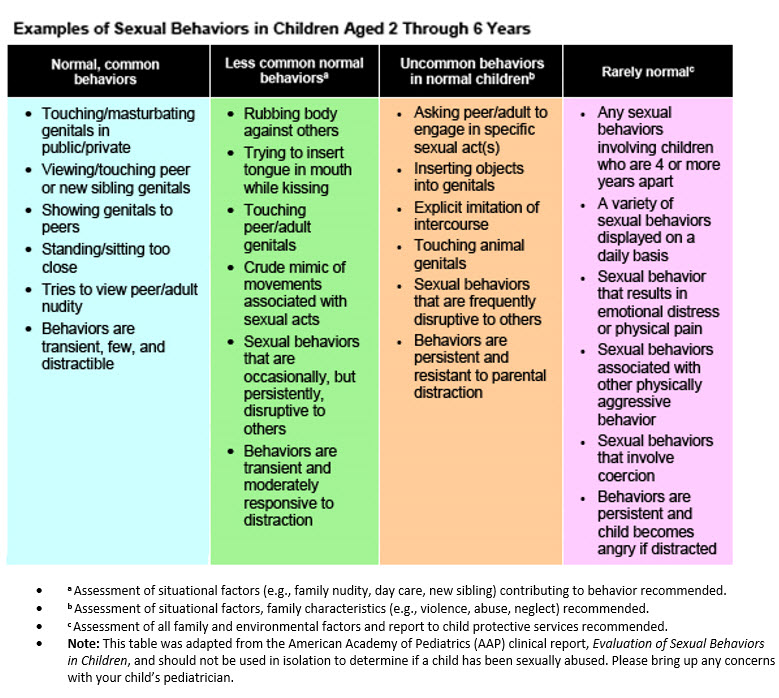what to do if your child kisses someone privates
Sexual Behaviors in Young Children: What's Normal, What'southward Not?


Page Content
It tin can be easy for parents to talk with their children nigh the differences between correct and wrong, simply it is ofttimes more difficult for parents to talk with their children about sexual evolution.
At a very young historic period, children begin to explore their bodies by touching, poking, pulling, and rubbing their body parts, including their genitals. Every bit children abound older, they volition need guidance in learning about these trunk parts and their functions.
Here's some information and tips from the American Academy of Pediatrics (AAP) to help you lot tell the difference between "normal" sexual behaviors and behaviors that may signal a problem.
What's Normal?
Here's a listing of what pediatricians say is normal, common sexual behavior in ii through half-dozen-year-olds.
When these behaviors happen, try to redirect your child's attention to more appropriate behavior by saying something such as, "Grown-ups practise that in individual, and you should, as well." Reinforce that children should respect each other, and it is not OK to bear upon anyone else's private parts. As well, remind your child to always tell you or another trusted grown-up if anyone always touches his or her private parts.
-
Touching/masturbating genitals in public or individual
-
Looking at or touching a peer's or new sibling'southward genitals
-
Showing genitals to peers
-
Standing or sitting too close to someone
-
Trying to see peers or adults naked

Scarlet Flag Behaviors
Parents also need to know when a child's sexual beliefs appears more than than harmless curiosity. Sexual beliefs problems may pose a risk to the safety and well-beingness your child and other children and can signal concrete or sexual abuse or exposure to sexual action.
Sexual behavior problems in young children include whatsoever act that:
-
Occurs frequently and cannot be redirected
-
Causes emotional or physical pain or injury to themselves or others
-
Is associated with physical aggression
-
Involves coercion or force
-
Simulates adult sexual acts
Torso Safety Education Tips for Parents
Parents should begin to teach their children most body safety between the ages of 3 to 5.
-
Use appropriate language. Teach children proper names for all torso parts, including names such as genitals, penis, vagina, breasts, buttocks, and private parts. Making upward names for body parts may give the idea that in that location is something bad about the proper name. Understand why your child has a special proper noun for the body part but teach the proper proper name, too. Also, teach your kid which parts are individual (parts covered by a pond suit).
-
Evaluate your family'southward respect for modesty. While modesty isn't a concept most young children can fully grasp, you can notwithstanding use this historic period to lay a foundation for future discussions and model good beliefs. If you have children of various ages, for example, it's important to teach your younger children to give older siblings their privacy. Usually, older siblings volition teach the younger ones to get their clothes on, for case, considering they might take friends over or because they are maturing and feel pocket-sized even in front of their younger brothers and sisters.
-
Don't force affection. Do not strength your children to give hugs or kisses to people they do not want to. It is their right to tell fifty-fifty grandma or grandpa that they exercise not want to requite them a buss or a hug adieu. Inappropriate touching—especially by a trusted developed—tin exist very confusing to a child. Constantly reinforce the thought that their torso is their own, and they can protect it. It is very important that your child knows to tell you or another trusted grown-upward if they have been touched. That mode, your child knows information technology'southward also your chore to protect them.
-
Explain what a good vs. bad touches are. Yous can explain a "good impact" as a way for people to bear witness they care for each other and assistance each other (i.due east., hugging, holding hands, irresolute a baby's diaper). A "bad affect" is the kind you don't like and want it to stop right abroad (i.e., hitting, boot, or touching individual parts). Reassure your child that nearly touches are okay touches, but that they should say "NO" and need to tell you near any touches that are confusing or that scare them.
-
Give your children a solid dominion. Teach them it is NOT okay for anyone to wait at or touch their private parts, or what is covered by their swimsuits. It is easier for a child to follow a rule, and they volition more than immediately recognize a "bad affect" if they have this guideline in mind. Reassure your children that yous will mind to them, believe them, and want to keep them protected.
-
Control media exposure. Go to know the rating systems of video games, movies, and television shows and make use of the parental controls available through many net, cablevision, and satellite providers. Providing advisable alternatives is an important part of avoiding exposure to sexual content in the media. Be aware that children may see adult sexual behaviors in person or on screens and may non tell yous that this has occurred.
-
Review this data regularly with your children. Some adept times to talk to your children about personal safety are during bath time, bedtime, and before any new situation. From child care to sports practices to dance classes, not to mention camps and after-school programs, children are meeting and interacting with many different adults and children on a daily basis.
-
Expect questions. The questions your kid asks and the answers that are appropriate to requite will depend on your child's age and power to understand. The following tips might make it easier for both of you:
-
Don't express joy or giggle, fifty-fifty if the question is cute. Don't react with anger. Your child shouldn't be fabricated to feel aback for his or her curiosity.
-
Exist brief. Don't go into a long explanation. Answer in simple terms. For instance, your preschooler doesn't need to know the details of intercourse.
-
Run across if your child wants or needs to know more. Follow up your answers with, "Does that answer your question?"
-
Listen to your child's responses and reactions.
-
Be prepared to repeat yourself.
Talk with Your Child's Pediatrician
If yous are currently dealing with any of these problems or have additional questions, talk with your child's pediatrician. He or she can piece of work with y'all to distinguish age-appropriate and normal sexual behaviors from behaviors that are developmentally inappropriate or betoken potential abuse. Asking for help simply means yous want what is best for your child, and you will practise whatever yous tin to help him or her succeed.
Additional Information & Resources:
-
Potty Talk: How Parents Tin Discourage the Beliefs
-
How to Shape & Manage Your Young Kid'due south Behavior
-
Gender Identity Development in Children
-
Social Development in Preschoolers
-
Sexual Corruption
-
Child Abuse and Neglect
Commodity Trunk
- Last Updated
- 4/1/2019
- Source
- American Academy of Pediatrics (Copyright © 2016)
The information independent on this Web site should not be used as a substitute for the medical care and advice of your pediatrician. At that place may be variations in treatment that your pediatrician may recommend based on individual facts and circumstances.
Source: https://www.healthychildren.org/English/ages-stages/preschool/Pages/Sexual-Behaviors-Young-Children.aspx
0 Response to "what to do if your child kisses someone privates"
Post a Comment